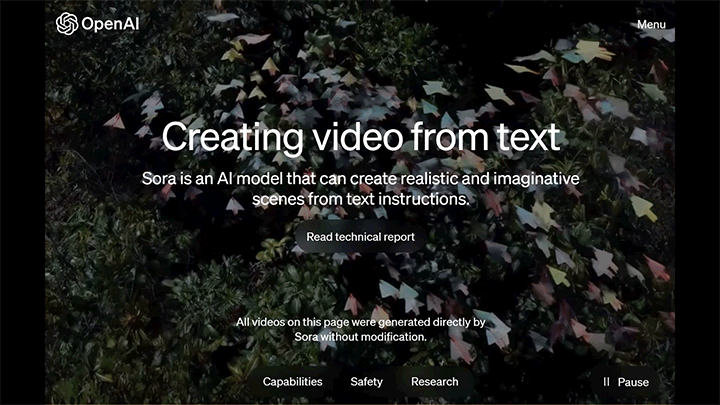Core Concepts
OpenAI introduces Sora, an advanced text-to-video model, revolutionizing the AI video industry by creating realistic scenes from text instructions.
Abstract
OpenAI's latest model, Sora, is a groundbreaking AI tool that generates videos based on text prompts. The model aims to simulate the physical world accurately and create compelling visual content. Sora can generate complex scenes with multiple characters and emotions while maintaining high visual quality. Despite its strengths, the model has some limitations in accurately simulating physics and understanding cause and effect instances. OpenAI emphasizes safety measures to address potential misuse of the technology.
AI Tools: OpenAI Reveals Sora and Shocks the AI Video Industry by Jeff Foster - ProVideo Coalition
Stats
Sora can generate videos up to a minute long while maintaining visual quality.
The model may struggle with accurately simulating complex scenes' physics.
It uses a transformer architecture similar to GPT models for superior scaling performance.
Quotes
"Despite extensive research and testing, we cannot predict all of the beneficial ways people will use our technology." - OpenAI
"Hollywood is about to implode and go thermonuclear." - X user response to Sora's arrival
Key Insights Distilled From
by at www.provideocoalition.co... 02-17-2024
https://www.provideocoalition.com/ai-tools-openai-reveals-sora/
Deeper Inquiries
How might generative AI tools like Sora impact creative industries beyond video production?
Generative AI tools like Sora have the potential to revolutionize various creative industries beyond video production. For example, in graphic design, AI-generated content can assist designers in creating complex visuals quickly and efficiently. In marketing and advertising, AI-generated content can help tailor campaigns to specific target audiences by analyzing vast amounts of data. Additionally, in music composition, AI tools can aid musicians in generating melodies or harmonies based on certain parameters provided. Overall, these tools have the capability to streamline workflows, enhance creativity, and open up new possibilities for artists across different fields.
What are potential drawbacks of relying on AI-generated content for creative endeavors?
While generative AI tools offer numerous benefits, there are also potential drawbacks to relying solely on AI-generated content for creative endeavors. One major concern is the risk of homogenization and lack of originality in artistic output when using pre-programmed algorithms to generate content. Creativity often thrives on uniqueness and human emotion that may be difficult for machines to replicate authentically. Another drawback is the ethical implications surrounding ownership and copyright issues related to AI-generated work. Determining intellectual property rights and ensuring fair compensation for creators involved in collaborative projects with AI systems can pose challenges.
How can advancements in AI technology like Sora influence societal perceptions of creativity?
Advancements in AI technology such as Sora have the power to influence societal perceptions of creativity by challenging traditional notions of authorship and artistic expression. As more individuals interact with AI-generated content or collaborate with intelligent systems like Sora, there may be a shift towards recognizing machine intelligence as a legitimate form of creativity alongside human ingenuity. This could lead to broader acceptance of non-human entities contributing meaningfully to cultural production and innovation within society. However, it may also spark debates about what constitutes genuine creativity versus algorithmic replication, prompting discussions about the essence of artistry and individuality in an increasingly automated world.
0
